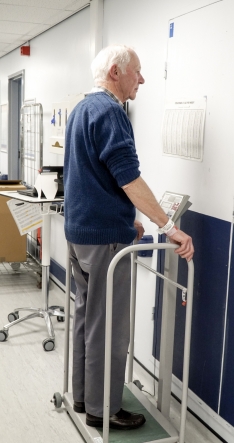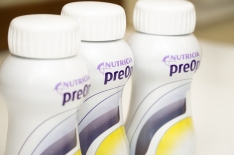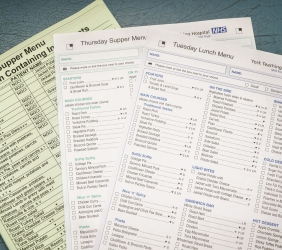Patients
Nutrition

Nutrition is important both before and after surgery. Good nutrition can help you heal better, reduce complications and reduce the length of hospital stay. It is important to ensure that you are eating enough calories, protein, vitamins, and minerals to help speed your recovery.
 The standard way to assess your weight is through the use of body mass index. This will be calculated at pre-assessment or you can use the NHS calculator to see what it is here. An ideal BMI is 18.5-24.9kg/m2.
The standard way to assess your weight is through the use of body mass index. This will be calculated at pre-assessment or you can use the NHS calculator to see what it is here. An ideal BMI is 18.5-24.9kg/m2.
I am underweight, what does this mean?
Being underweight can increase risks in surgery, and slow down the rate at which you recover. If you have been unwell you may have lost your appetite and your body may not be getting the nourishment it requires.
If this is the case you may be referred to a Dietitian. If they have advised you to follow a special diet please check with them before following the advice here.
If you are underweight:
- You need to make sure the food you do eat is as nourishing as possible. The aim is to get as many calories and nutrients as possible into the diet, so the usual “healthy eating” (low fat, low sugar) advice does not need to be followed at this time.
- Eat regularly. Three meals and three snacks a day is normal.
- Nourishing drinks are useful to have between meals. Drink milk based drinks rather than water or fizzy drinks. You may also like to try one of the “over the counter” supplement drinks (e.g. Complan, Meritene) available at most supermarkets and chemists.
- See the Are you getting enought to eat? booklet for more information.
I am overweight what does this mean?
Being overweight can increase the risks of surgery and increase the chances of chest infections, breathing difficulties, blood clots, wound infections and poor wound healing.
Losing just a small amount of weight prior to your surgery, if overweight can help to reduce some of the risks.
If you are overweight:
- Try to lose weight. Below is some information to help you
- Increase your activity levels
- Stop smoking
- Control your blood sugars if you are diabetic
- Read the Health Eating information booklet provided by the hospital
If you need to improve your nutrition, gain weight, lose weight, or control your blood sugar levels before surgery, your Doctor may refer you to a Dietitian who will work with you to create a nutrition plan to help you meet your goals. Alternatively you can request your GP or Consultant refers you to the Dietitian if you are concerned about your weight.
Enhanced Recovery (ERAS)

At your pre-assessment appointment you may be given some carbohydrate drinks to take called pre-Op.
Taking these drinks as prescribed can help to reduce the stress of surgery on your body, help to prevent dehydration and ensure a speedy recovery
The Enhanced Recovery Carbohydrate Loading sheet is avaliable here.
Eating and drinking after your operation
It is important to have good nutrition after your operation to help your body heal.
After your operation, you will be allowed to drink freely except for fizzy drinks.
You will be started on a small amount of light diet once you have been assessed by the doctors and will build up your oral intake from there with the aim of getting you back to a normal diet as soon as possible.
Occasionally your appetite maybe affected by feelings of sickness. Please inform the nurse looking after you and they will provide you with medication for the sickness and advise you on what you should be eating and drinking during this time.
If you have difficulty eating a normal diet, have lost a significant amount of weight or have complex nutritional concerns or issues then you may be referred to the Dietitian.
Food and drink in Hospital
 Meal times may vary during your stay in hospital, but they are usually at the following times:
Meal times may vary during your stay in hospital, but they are usually at the following times:
Breakfast 7.30am to 9am
Lunch 12 noon to 1.15pm
Supper 4.30pm to 6pm
You will be asked to complete a menu sheet. The nursing staff will help you if needed.
Our menus offer a range of dishes designed to meet different tastes and dietary needs. We always offer a vegetarian option. If you need a special diet for religious or other reasons, we can provide this for you.
If you require any assistance about diet please ask the ward staff to contact the Catering Manager or Dietitian.
Food is available 24 hours a day from the ward kitchen service.
Drinks
Drinking water is provided throughout the day for patients. Hot drinks are served during the morning, afternoon, evening and after each meal.
Schemes currently in place
All wards offer a protected mealtime service during which patients are left to eat without interruption from staff. There is also a red tray initiative for patients who need more help with their meal and red jugs for patients who require extra hydration

